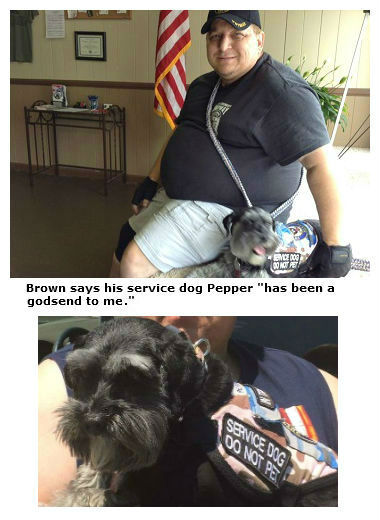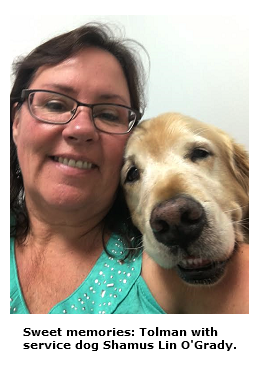Triad’s four-legged servants are always at work
|
Pepper never misses a Sunday at Triad Baptist but isn’t likely to strike up a conversation with you and prefers vests over traditional church attire.
That’s because Pepper is James Brown’s trained service dog and, according to a University of Arizona study, one of about 587,000 serving Americans with a wide range of disabilities, from diabetes to Post Traumatic Stress Disorder.
Given the role these dogs play — those who are trained to work with diabetic patients can, by smell, sense and warn their owners when insulin levels are dropping — anything that distracts them from their work could be a matter of life and death.
It’s why you should always look to their owners for how to approach their dogs and resist the urge to pet or touch them unless their owner approves. See “10 Things Service Dog Handlers Want You to Know” for more about what makes these amazing animals so unique.
|
“When Pepper is out with me she is a working dog,” Brown said. “She has been a godsend to me and goes with me everywhere I go.”
A retired electrician for the U.S. Navy, Brown traces his need for Pepper’s skills to an incident aboard the USS Midway aircraft carrier when a liquid oxygen container exploded and killed a shipmate. He suffered survivor’s guilt and memories from the grisly aftermath.
As with other PTSD sufferers, Brown startles easily so Pepper keeps a lookout for those who don’t know about Brown’s condition and what coming up behind him can mean.
“She will wake me from a nightmare, or, when I’m in the grocery store, she will step behind me and alert me so I know someone is coming up behind me,” he said. “I had real bad fears in church one day, and Pepper sensed that and got up on my knee. Just by petting her, it calmed me down.”
Just as Pepper rescued Brown, he rescued her two years ago when he got her from Forsyth Animal Control. The nonprofit Saving Grace K’9s equipped the toy schnauzer for her service-dog role. Brown said Pepper was so cut out for the work that she completed her ‘good citizen’ training in six weeks instead of the normal 20, and her service-dog training in six months instead of one year.
“She’s a very smart dog and loves to play,” he said. “When the service-dog vest is off, she’s a regular dog.”
Brown is not the only person at Triad who knows firsthand the difference the dogs can make and who exhibits the truth of Proverbs 12:10 — that the fruit of righteous living is also evident in how people treat the animals under their care.
Until he died in December of a heart ailment, Randi Tolman’s dog Shamus Lin O’Grady was a familiar sight at the church — helping her overcome the panic attacks and anxiety that followed back-to-back flights and the end of her 38-year marriage.
One flight had severe turbulence, and the other repeated approaches and a dicey landing in bad weather.
“The thought of flying after that was just out of the question,” Tolman said. Just as in Brown’s case, Shamus proved a godsend and helped her get her life back on track. “I had decided with much prayer that if Shamus passed in a few years I would plan to live without a dog. God knows my path, and I’m trusting Him for this, even though it happened much sooner than I had expected.”
When she had her dog, Tolman said repeated requests to pet him and all the attention just added to her anxiety. To those who don’t understand service dogs are working and not pets when they are out with their owners, she said ‘no’s’ about petting them can be perceived as rudeness but is anything but.
“When someone comes to pet one of these dogs or calls their name, they stop focusing on you and your condition, and by petting them and calling out to them, they think it’s ok to be your buddy,” she said. “The best thing you can do is politely ignore them, and realize their owners love them very, very much since they are their lifeline.”
Paul Bowskill, general manager of Service Dogs America, a company that sells harnesses, vests and wallet cards that identify dogs as service animals, agreed, telling Serenity Health never to think of them as pets. “They are an extension of the person who has the disability.”
More in Insights & Information
April 18, 2024
May Ladies Connect with Jonathan PhippsApril 17, 2024
BUILD: VBS Volunteers NeededApril 11, 2024
Mother's Day Services

